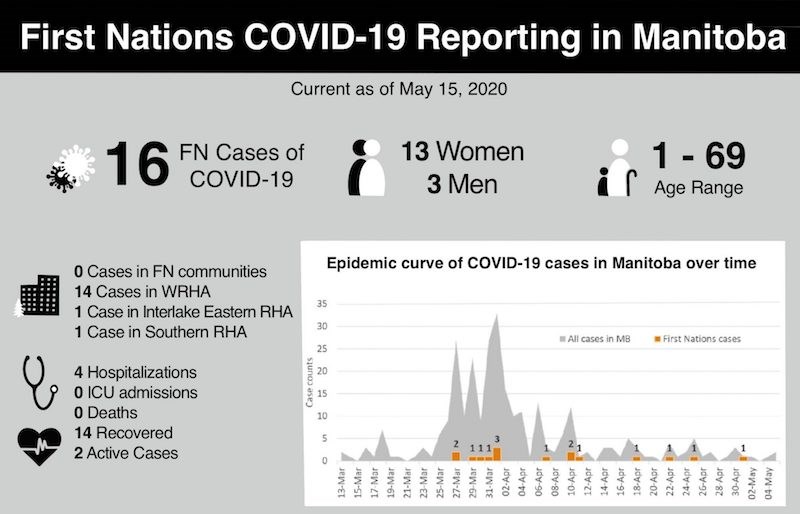Sixteen First Nations people living off-reserve in Manitoba tested positive for COVID-19 between March 27 and May 12, said the Manitoba First Nations Pandemic Response Co-ordination Team May 15.
Fourteen of them were residents of the Winnipeg Regional Health Authority area. The others were residents of the Interlake-Eastern health region and the southern health region.
Thirteen of those who tested positive were female and three were male. Nearly three-quarters acquired the virus through close contact with a known positive case while 27 per cent were exposed to it through travel.
Fourteen of the First Nations members who tested positive are now listed as recovered, while two are still considered active. None of those infected required hospitalization. The most affected age group is people between 20 and 29 years old.
No positive tests for COVID-19 have been recorded among Indigenous people living on First Nations to date. So far, 1,488 First Nations people living on-reserve have been tested for the novel coronavirus.
“I’m thankful to know there are no identified cases of First Nations people in the Northern Health Region,” said Manitoba Keewatinowi Okimakanak Grand Chief Garrison Settee in a press release. “I commend the chief and councils of First Nations in Manitoba for working diligently to implement measures that have helped to keep COVID-19 out of our communities. I want to encourage people to continue to limit their travel and be vigilant when it comes to observing public health measures that exist to help limit the spread of the COVID-19 virus. Let’s work together to keep this virus out of Northern Manitoba.”
Manitoba’s public health department has been asking people who test positive for COVID-19 about their Indigenous identity since April 3, though the information is only being shared with Indigenous partners.
This data collection is intended to help monitor the introduction and spread of COVID-19 among Manitoba’s Indigenous population both on and off-reserve, said a May 6 press release from MKO.
The agreement with the province to collect and share this data was negotiated between the government and the Health Information Research Governance Committee (HIRGC), made up of First Nations health directors and First Nations academics, which was established in 1998.
“The data sharing process was approved by our committee and authorized FNHSSM [First Nations Health and Social Secretariat] to negotiate and begin working with partners to develop a critical data gathering tool and process to support First Nations and other organizations in their planning and monitoring of First Nations COVID-19 cases,” said HIRGC co-chair Doris Young of Opaskwayak Cree Nation (OCN). “This is a collaborative partnership with the province that recognizes First Nations self determination and governance of our own data and utilizes the OCAP [ownership, control, access and possession] principles to determine the standards and parameters of how First Nations data is used for the benefit of our people.”
Assembly of Manitoba Chiefs Grand Chief Arlen Dumas said any First Nations person with possible COVID-19 symptoms such as a cough, runny, nose, fever or shortness of breath should get tested as soon as possible.��
“Continue to practise safety measures at home, in your First Nation and when you have to leave,” said Dumas. “And as part of that, listen to directions provided by chiefs and councils as well as public health officials as they are working to keep us all safe from this virus.”
Any Manitoban with possible COVID-19 symptoms can now go to a testing centre to be tested without having to be referred via Health Links.
“We encourage people to continue to be diligent about following the effective public health measures to stop the spread and minimize the risks,” said FNHSSM chairperson��Chief Sheldon Kent. “I’d like to remind everyone of the public health measures, which include following physical distancing whenever you are outside of your home; limiting the size of your gatherings to less than 10 people; staying outside as much as possible if you are visiting with others (and still keep visits to less than 10 people); wash your hands frequently; and limit non-essential travel outside of or between communities.”




